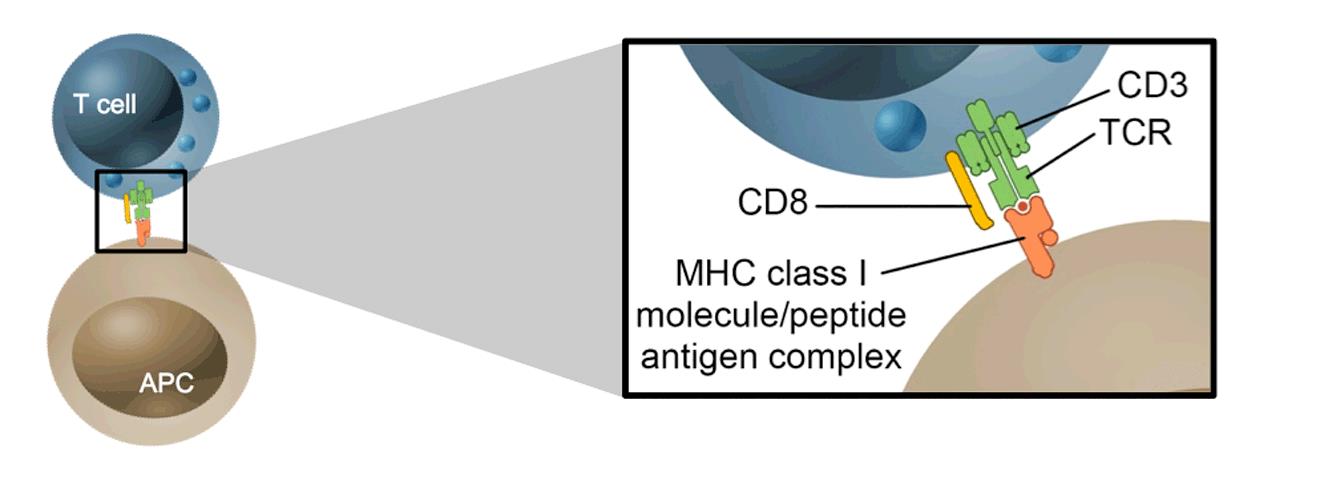As a leading service provider in the field of antibody discovery and immunotherapy for years, Creative Biolabs can provide customers with professional bispecific T-cell receptor (TCR) development service in a de novo manner. Bispecific TCR is a molecule that can regulate the body's immune system by redirecting and promote the T-cell response towards cancer cells with specific tumor targets.
Background
The TCR is a molecule existed on the surface of T cells, or T lymphocytes. Its responsibility is to recognize fragments of antigen to provide peptides bound to major histocompatibility complex (MHC) molecules. The relationship between the binding TCR and antigen peptides is unrestricted and gradually degenerated, which means that TCRs and antigen peptide are not in a biunique relationship. Typically, the TCR is made up of two different protein chains. After being combined with antigenic peptide and MHC (peptide/MHC complex) via TCR, the T lymphocyte will be activated through signal transduction. This is a series of biochemical events mediated by associated enzymes, co-receptors, and specialized adaptor molecules, resulting in activation of transcription factors.
Introduction of Bispecific TCR
Bispecific TCR molecules can leverage the body's immune system by regulating the T-cell response towards cancer cells with specific tumor targets. There are two domains of our bispecific T-cell receptor. One of them is an affinity-maturated and highly selective TCR domain that can recognize and bind to a tumor-specific peptide target presented in the context of HLA class I receptor, the other is a T-cell recruiting antibody domain directed against CD3 or other immuno-modulating T-cell surface proteins. The characteristic of these novel receptors allows T cells to be activated and attack the tumor, regardless of the T cells'intrinsic specificity. After being administrated to the patients, our bispecific TCR will selectively bind to the surface of targeted tumor cells. Then the bispecific TCR will recruit and activate T cells via CD3 binding initiates tumor killing.

Fig 1. Antigen presentation stimulates T cells with the help of TCR.
Features of Our Service
Creative Biolabs is a leader in the field of immunotherapy with great reputation and experience. We now provide tetravalent bispecific T cell engaging antibody design and construction services to a large number of customers around the world. We take the responsibility to promote your projects and lead the progress to clinical trials with the help of our advanced technologies and resources. For more detail information, please feel free to contact us. We will get back to you as soon as possible.
For any technical issues or product/service related questions, please leave your information below. Our team will contact you soon.
All products and services are For Research Use Only and CANNOT be used in the treatment or diagnosis of disease.
 NEWSLETTER
NEWSLETTER
The latest newsletter to introduce the latest breaking information, our site updates, field and other scientific news, important events, and insights from industry leaders
LEARN MORE NEWSLETTER NEW SOLUTION
NEW SOLUTION
CellRapeutics™ In Vivo Cell Engineering: One-stop in vivo T/B/NK cell and macrophage engineering services covering vectors construction to function verification.
LEARN MORE SOLUTION NOVEL TECHNOLOGY
NOVEL TECHNOLOGY
Silence™ CAR-T Cell: A novel platform to enhance CAR-T cell immunotherapy by combining RNAi technology to suppress genes that may impede CAR functionality.
LEARN MORE NOVEL TECHNOLOGY NEW SOLUTION
NEW SOLUTION
Canine CAR-T Therapy Development: From early target discovery, CAR design and construction, cell culture, and transfection, to in vitro and in vivo function validation.
LEARN MORE SOLUTION